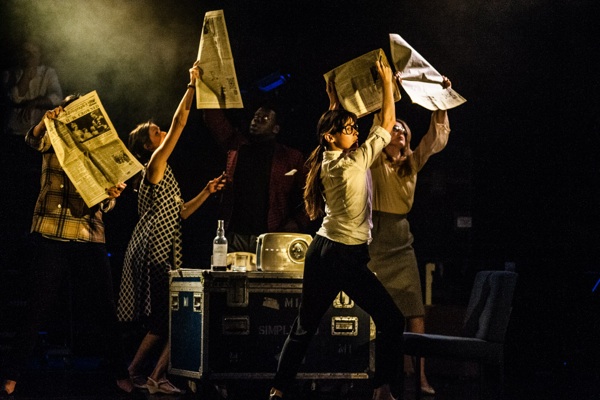Squint
at Charing Cross Theatre
18.09.2014
How
do we choose to consume the news ? This timely piece suggests some
answers, raises many questions and keeps its audience intrigued for a
tense 90 minutes.
“We
theatricalise the state of our mediatised lives ...” There are
moments near the beginning, when News Editor Neil is getting a
Twitter roasting, when it looks as though the tone might be as clunky
and didactic as that unfairly decontextualised soundbite from
author/director Andrew Whyment. #literally.
But dramatic instincts kick in, and the intriguing structure of the
story carries the “debate-sparker” effortlessly to its gripping
conclusion.
It's
a play for the now generation, most likely to set its news agenda by
what is trending. Whyment, and his company Squint, working with young
playwrights and a young cast in “topical, contemporary
ensemble-driven theatre”.
The
visual style is familiar. Is Curious Incident a sub-genre now, like
French Farce ? In the narrow perspective of the Charing Cross, a
harshly-lit rectangular acting area is surrounded on three sides by
seats for the actors, with a rack of costumes just visible. Roadie
cases stand in for much of the furniture. Physical set-pieces include
planes, trains and the tube; there's a newsroom ballet, another with
suitcases, even pretty much a production number with umbrellas [“Bad
Moon Rising”].
Difficult
to discuss the plot development without giving away too many twists.
#spoilers.
It involves three soldiers, missing in Helmand, an unnamed “Royal
Prince”, a clearly named Australian media mogul arriving in the UK
to bid for the News of the World, a scoop born on Twitter, a
fictional tv newsroom and an audacious show-and-tell revenge. Central
to all this is Jamie, the squaddie's naïve but canny younger
brother, brilliantly played by Cole Edwards. Far from being condemned
to the regulation fifteen minutes of Facebook fame, he turns out to
be the future, too …
There
is clever cutting between the two plot-lines: a nice five minutes of
confusion on the airport concourse where Sam Jenkins-Shaw, playing
two characters decades apart, is hassled by Jamie and unwittingly
takes Rupert's luggage. And the young story-teller heading on BOAC to
Fleet Street tells a nervous Mary about a plane-crash as the
transparent fish-tank NSC studio goes into meltdown. Our credulity is
tested from time to time – the sister of another soldier has no
access to news for three days [no broadband] – but the frozen
moment of live television is a triumph of meaningful theatricality.
Palpable
energy from the ensemble of eight as the plot unravels, priorities
are changed, damage is controlled. Tom Gordon is Neil, most hated man
in Britain, and Kevin Phelan compelling as “Red”, arriving in 60s
Britain with a mission to change the way the news is delivered.
Long
Story Short makes no judgements about the changes the years between
have brought. Should we be grateful or fearful that the news is
consumer-driven, that the fast always beats the slow, that the
preferred medium of the future is the blogosphere, seemingly unaware
of the difference between reality tv and real events ? A democracy
of dunces ? #public
interest
this piece first appeared on The Public Reviews


No comments:
Post a Comment
Note: only a member of this blog may post a comment.